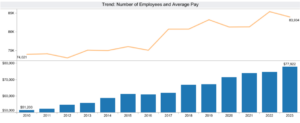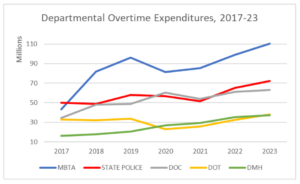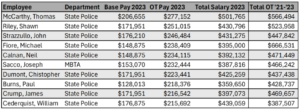State Overtime Expenditures Jump, Even as Employment Increases
Labor shortages and significant pay increases to attract and retain employees have become a new normal since the outset of the pandemic. Officials claim the state government is no exception, often having trouble finding qualified workers for open positions. However, trends in employment and staggering levels of overtime pay paint a somewhat different picture.
State spending across the board has soared in the last several years, as tax revenue and federal monies boomed during the pandemic and shortly thereafter. Using 2023 dollars to control for inflation, the state spent $1.5 billion more in payroll in 2023 than it did in 2010.
That includes an inflation adjusted increase of $6,400 (2023 dollars) in average pay and the hiring of nearly 10,000 new employees during that time.
It is also notable, however, that even with the remarkable growth in both number of employees and payroll expenditures, the state government’s budget grew at such an incredible rate from 2010 to 2023 – more than doubling – that payroll spending as a percent of all spending actually decreased from 18 to 15 percent of the total budget.
And while a significant number of employees have been added to the payroll over the last decade, 2023 was a down year in hiring. 1,500 fewer employees were on the payroll in 2023 than in 2022.
Overtime Payouts
Of note is overtime pay, which since 2010 has seen the largest percent rise of any component of pay – growing from 3.95 percent that year to 7.93 percent of all pay in 2023 – a growth rate twice that of base pay. In nominal terms, overtime increased three-fold, or by $363 million – from $156 million in 2010 to $519 million in 2023.
Most of these payments are concentrated in just a few departments and a small subset of employees. The top departments for overtime pay included the MBTA, State Police Department, Department of Corrections, Department of Transportation, and the Department of Mental Health. All except the DOT, have seen significant growth in overtime expenditures since 2017.
Most of the top overtime-earning employees came from these departments. In fact, according to an analysis by the Boston Globe of the little over 500 state employees making more in overtime pay than base salary, over 60 percent were employed by one of those five departments.
Overtime expenditures for many of these departments directly correlate with worker shortages, especially those dealing with patient care and healthcare. For example, in 2023, the Department of Mental Health had the highest number of employees making more than double their base pay with overtime (159). From the year prior the department lost 15 percent of its total number of mental health I/II workers.
Mental health I/II workers made $9.7 million in total overtime in 2022 but $14.23 million in 2023, a nearly 50 percent year over year increase. This trend was also true for the Department of Corrections which saw a decrease of 20 percent in Correction Officer I’s and an increase of 33 percent for their overtime payouts, and the Department of Developmental Services, which saw a decrease of 26 percent of development services I/II workers and an increase of 80 percent in their overtime payouts.
The MBTA and the State Police, on the other hand, run counter to this trend. Both added employees in 2023 but paid out more in overtime than in the preceding years.
The MBTA’s $110 million in overtime in 2023 was by far the most of any department and represents a significant increase from 2017, when less than half that figure was paid out. Since 2019 the agency has added nearly 1,000 employees and yet overtime payments have still increased nearly 15 percent. This is likely due to expanded efforts to make repairs to aging and crumbling infrastructure. Yet overtime expenses for operators also increased by $2.6 million while the number of operators increased by 159.
The Largest Outlier
The most significant outlier was the State Police Department. Many police departments in Massachusetts and across the country have suffered from a rash of retirements and difficulty recruiting new hires, often attributing these struggles to shifting attitudes towards policing as a profession. This has in turn led to greater overtime being paid out to current officers who need to cover more ground as a result of the understaffing.
Unlike local departments, the State Police has not reported having difficulty finding new recruits. After a decrease in total employees from 2020-21, the department has since increased its total number by 12 percent – from 3,142 to 3,556 in 2023. Yet, overtime expenditures have continued to rise significantly.
The department has four positions that account for 90 percent of all overtime expenditures: troopers, troopers 1st class, sergeants, and lieutenants. Between 2019 and 2023 the state police added an additional 252 officers to those positions, yet during that time span spent an additional $15 million on overtime.
In fact, of the ten state employees receiving the most overtime pay, nine were state police – many of whom make more than double their base salary in overtime pay. Thomas McCarthy for example, has a base pay of $207,000 but took home a total pay of $502,000.
The labor shortage has certainly been a factor in state government’s rising payroll costs, especially in patient care and healthcare. Even so, the rate at which the Massachusetts state government is growing across the board during the last several years and the degree to which certain expenditures, like overtime payouts, have ballooned should be cause for some concern.
Other Sources to Explore
Overtime Pay Tally Reveals Large Disparities
MassOpenBooks: A Look at the Top Departments by Average Overtime Pay in 2018
About the Author
Aidan Enright is Pioneer’s economic research associate, responsible for analyzing data and developing reports on the state’s business climate and economic opportunity. Prior to working at Pioneer, he worked as a tutor and mentor in a Providence city school and was an intern for a U.S. Senator and the RI Department of Administration. Aidan earned a Bachelor of Arts in Political Science and Economics with a concentration in U.S. national politics from the College of Wooster.






